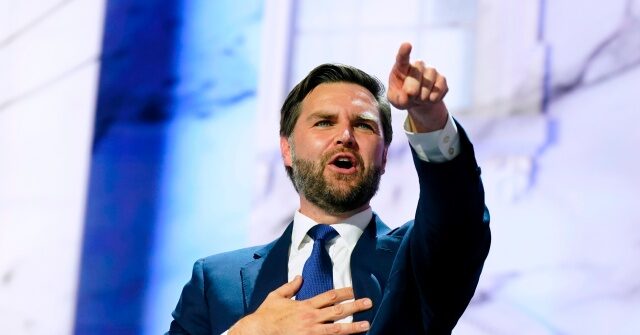
Big money donors, wealthy Wall Street brokers, and old-guard neoconservatives are seething over former President Donald Trump's choosing Sen. JD Vance (R-OH) as his vice presidential running mate in this year's election -- similar to 2016 when the same elite crowd was furious over Trump's candidacy.
The post Wall Street, Donors, Neocons Seethe Over Populist JD Vance Being Trump’s VP appeared first on Breitbart.

Big money donors, wealthy Wall Street brokers, and old-guard neoconservatives are seething over former President Donald Trump’s choosing Sen. JD Vance (R-OH) as his vice presidential running mate in this year’s election — similar to 2016 when the same elite crowd was furious over Trump’s candidacy.
While the GOP’s working class base embraces Vance, a populist-nationalist most known for his best-selling memoir Hillbilly Elegy about his childhood in the Rust Belt amid community-gutting globalization, the economic elite are taking to the pages of establishment media to voice their opposition.
“Wall Street will be begging for the return of Lina Khan (Biden’s top trust buster at the Federal Trade Commission) after two months of the Trump/Vance administration,” a Wall Street broker told the Financial Times, referencing Lina Khan who is favored by Vance because of her insistence on breaking up corporate monopolies.
Matt Stoller, an anti-monopolist who writes a substack newsletter called BIG, parsed out Vance’s risks within the GOP to shift the party into a populist big tent:
While a venture capitalist, in the mid-2010s, Vance began to rethink his priors, ultimately transitioning into a populist with aggressive stances on economics, immigration, and foreign policy. While there’s a temptation to see this change as purely opportunistic, Vance has taken political risks inconsistent with mere careerism. Indeed, four months ago, Vance told a crowd that “Lina Khan is one of the few people in the Biden administration that is doing a pretty good job.” In the GOP, those are fighting words. [Emphasis added]
What’s most strikingly different about Vance is something simple. Age. He’s young. Both he and Khan are in their 30s, and both grew up seeing the disastrous set of policies of the 2000s and 2010s, not the prosperity of the 1990s. Neither has a sanguine view of big tech, a view which is largely held by those who came of age in the 1990s and still at some level understand Google as a disruptive upstart and Mark Zuckerberg as a kid. To Vance and Khan, Google and Facebook are just the establishment. [Emphasis added]
Other Wall Street types who spoke to the Financial Times said they are effectively panicking over the prospect of an economic nationalist agenda led by Vance in a future Trump administration:
“We are very concerned about JD Vance playing an outsized role in a Trump administration,” said one big bank lobbyist. “Trump populism and Vance populism are not the same.” [Emphasis added]
“He represents a populist mindset, and he is clearly smart and considered the future of the party,” said another financial services lobbyist, who described Vance as an “intellectual powerhouse.” [Emphasis added]
“He represents something in the country that the coastal elites and big business have taken too long to recognise,” the lobbyist added, in an apparent reference to Vance’s ability to channel the anger and disenfranchisement of the working classes. [Emphasis added]
Vance is most at odds with Wall Street brokers and big business groups like the Chamber of Commerce on issues of immigration and trade. Unlike the Republican Party’s old guard, Vance backs a tight labor market with reduced immigration levels where the economy is tilted in favor of American employees over employers.
Likewise, on trade, Vance has assailed the job-killing free trade consensus that has reigned in Washington, DC over the last three decades — making multinational corporations richer than ever by allowing them to outsource working and middle class jobs to the lowest-wage countries in the world.
In Semafor, big business allies said “CEOs are shocked” by Vance becoming Trump’s running mate, even as his name had been floated for months as a top contender.
Oren Cass, of the American Compass, told Semafor exactly why Trump chose Vance:
Senator Vance has really been at the forefront of providing a critique of what’s wrong with globalization, what’s wrong with financialization, what’s wrong with just chasing cheap labor and rising stock prices. Just the fact of choosing Vance suggests that Trump doesn’t feel beholden to, or even loyal to Wall Street at this point. [Emphasis added]
The GOP’s wealthiest donors, who have often disapproved of Trump’s America First agenda, lobbied behind the scenes against Vance in the hopes of a more establishment-friendly pick like Sen. Tim Scott (R-SC).
Politico reported:
Vance’s opposition from the donor community, however, presented a challenge in the under-the-radar race for the vice presidential slot. Other contenders, like Burgum, Rubio, and South Carolina Sen. Tim Scott, had deep relationships with mainstream donors who were eager to undercut Vance. Republican megadonor Ken Griffin’s team conveyed to Trump that they didn’t want the Ohio senator. Murdoch, the former News Corp. chief executive, was also weighing in with Trump and making it clear he supported other prospects, including Burgum. The Murdoch family-owned New York Post and Wall Street Journal published separate editorials endorsing Burgum for the position. [Emphasis added]
Following Vance’s fiercely populist speech at the Republican National Convention (RNC) this week, in which he declared “We are done catering to Wall Street,” photos circulated of billionaire Rupert Murdoch and Sen. Lindsey Graham (R-SC), a darling of the donor class, sitting with somber faces in one of the arena’s suites.
Other neoconservatives, with deep financial ties to military contractors that rely on hawkish foreign policy to line their pockets, told Politico they are “scared to death” of Vance as vice president because he opposes unlimited spending in Ukraine and foreign interventionism.
John Binder is a reporter for Breitbart News. Email him at [email protected]. Follow him on Twitter here.




